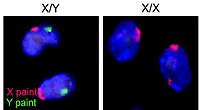
Photo from wikipedia
Germ cell tumors (GCTs) are rare tumors that can develop in both sexes, peaking in adolescents. To understand the mechanisms that underlie germ cell transformation, we established a GCT mouse… Click to show full abstract
Germ cell tumors (GCTs) are rare tumors that can develop in both sexes, peaking in adolescents. To understand the mechanisms that underlie germ cell transformation, we established a GCT mouse model carrying germ cell-specific BRafV600E mutation with or without heterozygous Pten deletion. Both male and female mice developed monolateral teratocarcinomas containing embryonal carcinoma (EC) cells that showed an aggressive phenotype and metastatic ability. Germ cell transformation started in fetal gonads and progressed after birth leading to gonadal invasion. Early postnatal testes showed foci of tumor transformation, while ovaries showed increased number of follicles, multi-ovular follicles (MOFs) and scattered metaphase I oocytes containing follicles. Our results indicate that Mapk over-activation in fetal germ cells of both sexes can expand their proliferative window leading to neoplastic transformation and metastatic behavior.
Journal Title: Journal of cell science
Year Published: 2022
Link to full text (if available)
Share on Social Media: Sign Up to like & get
recommendations!